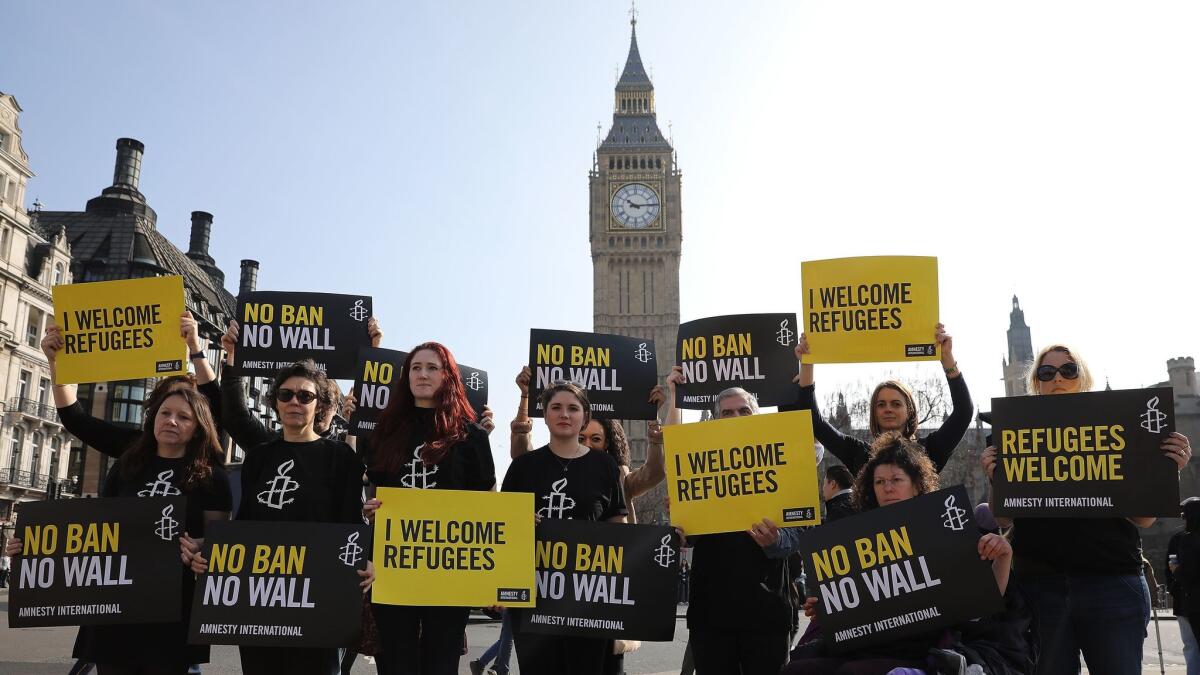Trump faces major hurdles — and his own words — in challenging rulings against his new travel ban

When President Trump issued his first travel ban on citizens from several Muslim-majority countries, the stated premise was simple: Give the government 90 days to review its vetting procedures to reduce the chances that a terrorist could get a U.S. visa.
That was 48 days ago.
With the executive order blocked by the courts — and judges now halting a revised order that was supposed to take effect Thursday — the legal battle over the constitutionality of the ban stretches on. Trump has vowed to pursue it all the way to the Supreme Court.
By then his administration will have had several weeks to review screening procedures, which opponents said weakens its original case for why the ban is necessary.
The ticking of time is just one of several problems Trump faces as his administration contemplates what so far has been a major blow to his fledgling presidency.
“He keeps losing,” said Steve Schmidt, a longtime Republican strategist who helped run Sen. John McCain’s 2008 presidential campaign. “He keeps facing these setbacks. At what point do they give up?”
Signing the original order was among Trump’s first acts as president, an effort to make good on promises of a “a total and complete shutdown of Muslims” and “extreme vetting” to prevent terrorism that were a centerpiece of the campaign.
But the courts rebelled. After a federal judge in Seattle and the 9th Circuit Court of Appeals in San Francisco put the original order on hold last month, the administration retooled it in hopes of addressing constitutional concerns.
Then on Wednesday a federal judge in Hawaii blocked the revised order, which called for pausing all refugee resettlement for 120 days and blocking citizens of six Muslim-majority countries — Iran, Libya, Somalia, Sudan, Syria and Yemen — from entering the U.S. for 90 days.
In a further rebuke of the order, a federal judge in Maryland ruled Thursday against the provision restricting travelers.
That leaves the Trump administration with few good options.
White House Press Secretary Sean Spicer said Thursday that the administration would “appeal the flawed rulings” and focus its initial challenge on the Maryland case in the 4th Circuit Court of Appeals in Richmond, Va.
That would let the Trump administration avoid — at least for now — taking the Hawaii case to the 9th Circuit, which Trump called a “bad” court after it blocked him the first time.
The 9th Circuit long ago developed a reputation for being more liberal than other federal appeals courts, although many lawyers say that’s no longer the case. Judges appointed by Democratic presidents outnumber Republican appointees on both the 9th and 4th circuit courts, but depending on luck of the draw, the three-judge panels that resolve cases in either circuit could include either conservative or liberal judges.
“If there’s a split between the two appeals courts, then it could possibly go to the Supreme Court for review,” said Jessica Levinson, a professor at Loyola Law School in Los Angeles.
If the immigration restrictions are ultimately defeated, part of the reason will have been Trump the campaigner.
In the Maryland case — which was brought on behalf of immigrants from Syria, Somalia and Iran whose families are in the middle of the visa approval process — U.S. District Judge Theodore Chuang’s decision quoted Trump’s campaign vows to suspend Muslim immigration as evidence that “the national security purpose is not the primary purpose of the travel ban.”
The judge, who was nominated to the bench by President Obama, wrote that it was “likely” that Trump’s ban violated the Constitution by discriminating against Muslims.
The U.S. district judge in the Hawaii case, brought by state Atty. Gen. Douglas Chin, seemed to agree, writing that despite the ban’s “stated secular purpose,” Trump’s own words acted against him.
“The illogic of the government’s contention is palpable,” wrote the judge, Derrick Watson, also an Obama nominee. “The notion that one can demonstrate animus toward any group of people only by targeting all of them at once is fundamentally flawed.”
None of the court orders on the travel ban are permanent but instead are meant to halt it while more thorough court proceedings determine its constitutionality.
But the Trump administration’s defeats have left some legal and political experts at a loss about what options it has left.
Margo Schlanger, law professor at the University of Michigan who was the head of civil rights for the Department of Homeland Security under Obama, said that Trump’s decision to delay the rollout of the revised order undermines his case that the order is urgent.
“It will be difficult for him to argue there’s an emergency need for a stay,” she said.
At the same time, the heavy focus on campaign statements in the recent rulings against Trump has perplexed other legal scholars, who predicted that Trump would prevail in appeals courts or in the Supreme Court.
“Candidates often speak very loosely, and I think it’s very risky to give that much weight to what candidates say during the campaign,” said Arthur Hellman, a law professor at the University of Pittsburgh.
Courts routinely look to legislative intent in interpreting laws passed by Congress. An appeals or Supreme Court decision in the case may determine whether they can also look to executive intent in deciding an executive order’s constitutionality.
I think we ought to go back to the first one and go all the way.
— President Trump
Jonathan Turley, a professor at the George Washington University Law School, said the battle would be a long one that is “clearly being groomed for the Supreme Court.”
But a Supreme Court case also could hold risks for Trump, who is awaiting the confirmation of his high court nominee, Neil M. Gorsuch. The court currently is split 4-4 between conservative and liberal justices.
Douglas Kmiec, a Pepperdine University law professor who was a Justice Department official in the Reagan and George W. Bush administrations, said Trump must be careful to not appear that he is pushing for Gorsuch’s confirmation in order to tip the court to his side on the travel ban.
“Gorsuch is a strong judge with a good record, but there is now political risk that his opposition can make it look like his appointment is being advanced to get a particular outcome in a particular case, and that politically will be very unhelpful,” he said.
He also said that Trump could wind up damaging his own case if he were to start criticizing Supreme Court judges as he has done to judges in the lower courts.
Speaking at a Nashville rally on Wednesday, Trump seemed unsure of his next move, or what kind of travel order he preferred.
At first, he called the Hawaii decision “terrible” and an “unprecedented judicial overreach” and vowed to “take our case as far as it needs to go, including all the way up to the Supreme Court.”
Moments later, Trump said he didn’t like the new order as much as the first because it was a “watered-down” version that he only agreed to on the advice of lawyers. “We ought to go back to the first one and go all the way,” he said.
Government lawyers have argued that the travel restrictions did not amount to a Muslim ban because they would apply only to a fraction of the world’s Muslim population. They said in the Hawaii and Maryland court hearings that Trump was acting within his powers to restrict immigration and protect the country from potential terrorists.
The original order, signed Jan. 27, spurred tens of thousands of visa cancellations, chaos at U.S. international airports and dozens of lawsuits.
That order stopped refugee resettlement from all countries for 120 days — and from Syria indefinitely — and banned citizens of Iran, Iraq, Libya, Somalia, Sudan, Syria and Yemen from entering the U.S. for 90 days while the government was to review its vetting procedures.
The new order tried to address court concerns by removing a preference for refugees who are religious minorities and giving exemptions from the ban to green-card holders and those who already have valid visas. It also removed Iraq from the list of countries whose nationals could not travel to the U.S.
Times staff writer Maura Dolan in San Francisco contributed to this report.
UPDATES:
3:50 p.m.: This article was updated throughout to include analysis from legal and political experts and the White House’s remarks on the Trump administration’s next steps.
8:35 a.m.: This article has been updated throughout with Times reporting.
This article was originally published at 4:40 a.m.
More to Read
Start your day right
Sign up for Essential California for news, features and recommendations from the L.A. Times and beyond in your inbox six days a week.
You may occasionally receive promotional content from the Los Angeles Times.








